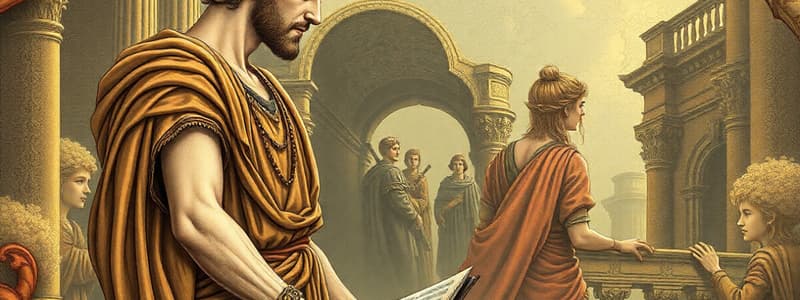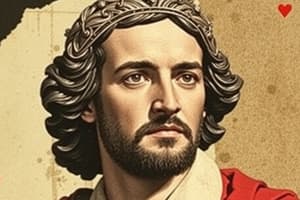Podcast
Questions and Answers
What does Cato identify himself as when speaking to his fellow countrymen?
What does Cato identify himself as when speaking to his fellow countrymen?
- A noble enemy
- A tyrant
- One who will yield
- Marcus Cato's son (correct)
How does young Cato characterize himself during the battle?
How does young Cato characterize himself during the battle?
- A foe to tyrants and friend to his country (correct)
- A humble soldier
- A foe to Brutus
- A friend to tyrants
What is the significance of Lucilius offering money to the First Soldier?
What is the significance of Lucilius offering money to the First Soldier?
- To bribe him for a quick death
- As a distraction to escape
- To honor Brutus upon his death (correct)
- To betray Brutus' location
What does Antony suggest should be done with Lucilius after he captures him?
What does Antony suggest should be done with Lucilius after he captures him?
What does Lucilius assure Antony about Brutus?
What does Lucilius assure Antony about Brutus?
What action does Young Cato take to assert his identity on the battlefield?
What action does Young Cato take to assert his identity on the battlefield?
How does Lucilius respond when confronted by the First Soldier?
How does Lucilius respond when confronted by the First Soldier?
What does Antony imply about the worth of Lucilius after capturing him?
What does Antony imply about the worth of Lucilius after capturing him?
What does Lucilius assert regarding the fate of Brutus?
What does Lucilius assert regarding the fate of Brutus?
In what manner does Brutus identify himself to his fellow fighters?
In what manner does Brutus identify himself to his fellow fighters?
How does the dialogue reflect the themes of honor and identity in the actions of Brutus and Young Cato?
How does the dialogue reflect the themes of honor and identity in the actions of Brutus and Young Cato?
What can be inferred about the nature of bravery as depicted through Lucilius's actions during the scene?
What can be inferred about the nature of bravery as depicted through Lucilius's actions during the scene?
What does Young Cato's proclamation on the battlefield reveal about the attitude of soldiers toward their leaders?
What does Young Cato's proclamation on the battlefield reveal about the attitude of soldiers toward their leaders?
In what way does Antony's conversation with Lucilius challenge the underlying motivations of loyalty and betrayal highlighted in the scene?
In what way does Antony's conversation with Lucilius challenge the underlying motivations of loyalty and betrayal highlighted in the scene?
Analyze how Brutus’s self-identification as a 'friend of his country' impacts the perception of his character in this scene.
Analyze how Brutus’s self-identification as a 'friend of his country' impacts the perception of his character in this scene.
How does Young Cato's declaration of his lineage influence the morale of the soldiers around him during the battle?
How does Young Cato's declaration of his lineage influence the morale of the soldiers around him during the battle?
What motives drive Lucilius in his offer to the First Soldier, and what does this reveal about his understanding of honor?
What motives drive Lucilius in his offer to the First Soldier, and what does this reveal about his understanding of honor?
In what ways does Antony's reaction to Lucilius challenge the traditional views of enemy and ally during war?
In what ways does Antony's reaction to Lucilius challenge the traditional views of enemy and ally during war?
What does Brutus’s self-identification as ‘my country's friend’ reveal about his personal values in the context of the battle?
What does Brutus’s self-identification as ‘my country's friend’ reveal about his personal values in the context of the battle?
How does the scene depict the concept of nobility in warfare through the characters' actions and interactions?
How does the scene depict the concept of nobility in warfare through the characters' actions and interactions?
Flashcards
Brutus's Loyalty
Brutus's Loyalty
Brutus demonstrates unwavering loyalty to the Roman Republic by fighting valiantly and refusing capture.
Cato's Allegiance
Cato's Allegiance
Young Cato, son of Marcus Cato, fights for freedom and loyalty to his country.
Lucilius's Sacrifice
Lucilius's Sacrifice
Lucilius, a loyal follower of Brutus, falsely claims to be Brutus to save his life, showcasing his loyalty and sacrifice.
Antony's Command
Antony's Command
Signup and view all the flashcards
Brutus's Capture
Brutus's Capture
Signup and view all the flashcards
Soldier's Morals
Soldier's Morals
Signup and view all the flashcards
Antony's Order
Antony's Order
Signup and view all the flashcards
Brutus's Rallying Cry
Brutus's Rallying Cry
Signup and view all the flashcards
Cato's Stand
Cato's Stand
Signup and view all the flashcards
Lucilius's Deception
Lucilius's Deception
Signup and view all the flashcards
Antony's Recognition
Antony's Recognition
Signup and view all the flashcards
Brutus's Identity
Brutus's Identity
Signup and view all the flashcards
Cato's Lineage
Cato's Lineage
Signup and view all the flashcards
Lucilius's Loyalty
Lucilius's Loyalty
Signup and view all the flashcards
Continued Search
Continued Search
Signup and view all the flashcards
Soldiers' Refusal
Soldiers' Refusal
Signup and view all the flashcards
Brutus's Final Stand
Brutus's Final Stand
Signup and view all the flashcards
Octavius's Involvement
Octavius's Involvement
Signup and view all the flashcards
Soldier's Challenge
Soldier's Challenge
Signup and view all the flashcards
Study Notes
The Battle Continues
- Brutus continues to fight valiantly, encouraging his soldiers, and proclaiming his identity as a friend of the republic.
- Young Cato, son of Marcus Cato, also joins the battle, declaring his allegiance to freedom and his lineage.
- Lucilius, a loyal follower of Brutus, encounters a soldier and offers him money to kill Brutus and be honored, showcasing the sacrifice and loyalty of Brutus' supporters.
- The soldier refuses the offer, recognizing the value of capturing Brutus alive. News of Brutus' capture spreads quickly.
Lucilius' Sacrifice
- The soldier who captures Brutus is commended by a fellow soldier and takes the news to Antony.
- Antony, unaware of the identity of the prisoner, praises the soldier and emphasizes the importance of having good men as friends.
- Lucilius steps in, revealing that he is the prisoner, and claims that Brutus would never allow himself to be captured alive. He assures Antony that Brutus can be found either dead or alive, always acting with honor.
- Antony discovers that the prisoner is not Brutus, but acknowledges his worth as a prize and orders for his safekeeping.
The Search for Brutus Continues
- Antony directs the soldiers to find Brutus and report back to Octavius' tent.
- The scene ends with the uncertainty of Brutus' fate. The play leaves open the possibility that Brutus may have died in battle or escaped capture.
Act V, Scene 4
- The scene opens with a battlefield, with soldiers from both armies fighting.
- Brutus, Cato, Lucilius, and other soldiers enter the scene.
- Brutus rallies his troops, encouraging them to fight bravely.
- Cato, the son of Marcus Cato, proclaims his identity, emphasizing his dedication to freedom and his country.
- Brutus similarly declares himself a friend of Rome.
- Lucilius, seeing young Cato fall, expresses admiration for his bravery, comparing him to the recently deceased Tintinius.
- A soldier challenges Lucilius to surrender, threatening death otherwise.
- Lucilius yields, but only to die, offering a bribe to the soldier to kill Brutus in his place and earn honor.
- The soldiers refuse to kill Brutus, recognizing his importance as a prisoner.
- They announce Brutus' capture to Antony, the general.
- Antony arrives and is told Brutus is captured.
- Lucilius, however, asserts that Brutus cannot be taken alive and will be found either alive or dead, but always true to his character.
- Antony, recognizing the worth of Lucilius despite his deception, orders his safekeeping and the continuation of the search for Brutus.
- Antony instructs the soldiers to inform Octavius about the situation.
The Capture of Brutus
- Brutus rallies his troops, emphasizing his patriotism and calling himself 'Brutus, my country's friend.'
- Young Cato also declares his loyalty, shouting "I am the son of Marcus Cato, ho!"
- Brutus and Cato both ultimately fall in battle.
- Lucilius, a loyal follower of Brutus, offers himself up as Brutus in order to save his life.
- Lucilius presents himself as the captured Brutus, claiming that Brutus is safe and cannot be taken alive.
- Antony, realizing the captured man isn’t Brutus, orders him to be treated well as he's a valuable prisoner.
- Antony sends soldiers to find Brutus to see if he is alive or dead.
The Capture of Brutus
- Brutus, Cato, and Lucilius are fighting alongside their soldiers against Antony's forces
- Cato calls out his identity, proclaiming himself as the son of Marcus Cato, an enemy of tyrants and a friend to his country
- Brutus also shouts his identity, declaring that he is Marcus Brutus, a friend of his country
- Lucilius and Cato are overwhelmed by enemy soldiers
- Lucilius offers a bribe to a soldier in exchange for killing Brutus
- The soldiers refuse, recognizing Lucilius' value as a prisoner
- Lucilius pretends to be Brutus, claiming that Brutus is safe
- Antony recognizes that the prisoner isn't Brutus, but still sees him as a valuable prize and orders him to be treated kindly
- Antony sends soldiers to search for Brutus, to determine if he is alive or dead
Studying That Suits You
Use AI to generate personalized quizzes and flashcards to suit your learning preferences.




